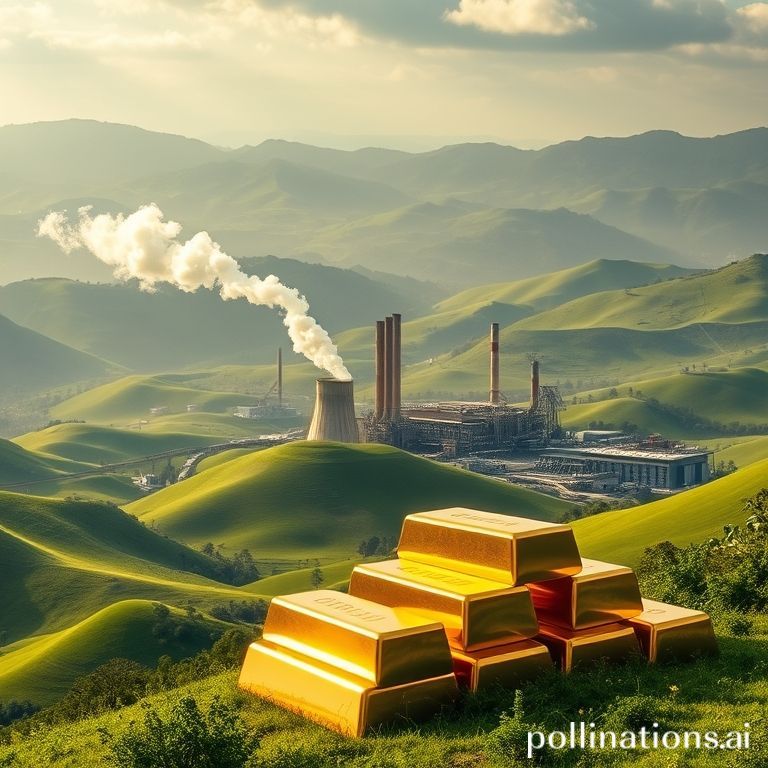
Uganda is charting a bold new course, aiming to transform its economic landscape by halting the export of unprocessed raw materials. At the heart of this ambitious strategy lies President Yoweri Museveni's unwavering conviction that for too long, Africa has been "robbed" of its wealth, exporting valuable resources only to see developed economies reap the lion's share of profits further up the value chain. This philosophy, crystallized into a ban on unprocessed agricultural products in 2021 and extended to all raw materials—including gold, lithium, and tin—in April, marks a pivotal shift towards domestic value addition. The clearest manifestation of this new direction is the inauguration of Uganda's largest gold project, Wagagai Gold Mining, an initiative poised to redefine the nation's engagement with its mineral wealth.
The Vision for Value Addition
President Museveni, a figure who has steered Uganda for 39 years, has consistently articulated a vision where the nation controls its destiny by processing its own resources. The ban on raw material exports is not merely an economic policy; it is a declaration of economic sovereignty. By refining minerals like gold within its borders, Uganda seeks to capture higher profit margins, create more domestic jobs, and foster industrial growth. This strategy aims to reverse decades of economic disempowerment where the country's rich natural endowments served only as inputs for foreign industries, leaving Uganda with minimal returns.
The Wagagai Gold Mining project stands as a monumental step in realizing this vision. It represents a significant departure from the traditional model of resource extraction, promising a future where Uganda’s gold is not just dug from the earth but also processed into high-purity metal within the country. This domestic refining capability is crucial for Uganda to participate meaningfully in the global gold market, moving beyond merely selling raw ore.
Wagagai Gold Mining: A Glimpse into the Future
The Wagagai Gold Mining venture is a testament to significant international collaboration, fueled by a substantial $250 million investment from China's Liaoning Hongda Enterprise. Operating as Wagagai Mining, the Ugandan subsidiary is equipped to handle 30 million tonnes of proven gold ore reserves. More impressively, the facility boasts the capability to refine gold to an exceptional 99.9% purity, positioning Uganda as a serious player in the refined gold market. Government projections are ambitious, forecasting an annual production of 1.2 metric tonnes of gold.
The economic ripple effects of this project are expected to be profound. When fully operational, Wagagai is anticipated to generate over 5,000 direct jobs, offering substantial employment opportunities in a region hungry for economic upliftment. Furthermore, gold exports from the facility are projected to inject over $100 million annually into the Ugandan economy throughout its anticipated 20-year lifespan. This contrasts sharply with Uganda's previous gold exports, which, while totaling $3.4 billion in 2024, largely originated from artisanal mining—a sector President Museveni actively seeks to curtail due to its often unregulated and environmentally impactful nature.
"Under my leadership, we will not export unprocessed minerals, as this undermines our economy," Museveni firmly stated, emphasizing that the Wagagai project will put an end to "wasteful" exports, ushering Uganda into a new era of value addition. This commitment underscores a broader nationalistic economic agenda.
The Complexities of the Uganda-China Relationship
While Wagagai Gold Mining heralds a new chapter for Uganda's economy, it also symbolizes a new phase in the evolving, yet often unequal, relationship between Uganda and China. Chinese investors have poured nearly $1 billion into various Ugandan sectors, including mining, agriculture, manufacturing, oil and gas, and industrial parks. This influx of capital undeniably fuels development and infrastructure, but for many observers, it also raises questions about the long-term implications of such deep economic ties.
For Beijing, projects like Wagagai are not just about financial returns; they hold strategic importance. Control over African minerals ensures a secure supply chain for China's rapidly growing industrial sector, bolstering its position on the global stage. This strategic interest is intertwined with China's broader Belt and Road Initiative, extending its economic and political influence across continents.
The Shadow of Debt
The deepening relationship, however, casts a shadow in the form of Uganda's burgeoning public debt. The nation's debt soared to an unprecedented $31.5 billion by June, with a significant $2.5 billion owed to Beijing in expensive loans. Parliamentary records reveal that Uganda paid China $178.7 million for debt servicing as of December 2024—a sum greater than payments to any other lender.
The escalating cost of servicing these loans has prompted Ugandan legislators to appeal to China for interest rate reductions, thus far without success. This situation highlights a critical dilemma: while Chinese investment provides much-needed capital for development, it simultaneously escalates Uganda's financial obligations, potentially creating a dependency that could compromise its economic sovereignty. The risk of so-called "debt-trap diplomacy" remains a persistent concern for many nations partnering extensively with China.
Ultimately, the Wagagai Gold Mining project embodies Uganda's aspiration for economic transformation through value addition. Yet, it also serves as a potent symbol of the intricate balance required when leveraging foreign investment for national development, particularly when dealing with powerful global players. As Uganda steps into this new era, the challenge will be to ensure that the pursuit of economic independence does not inadvertently lead to new forms of external control, ensuring that its gold truly benefits its people for generations to come.
